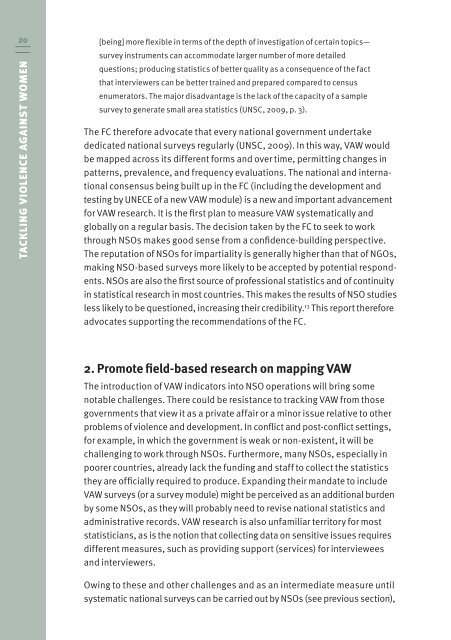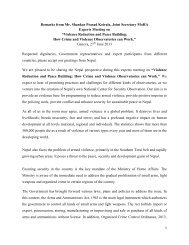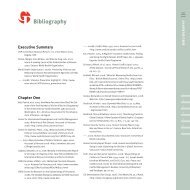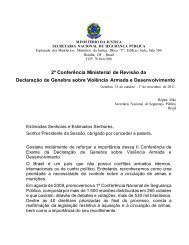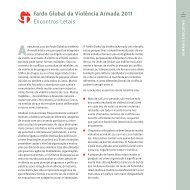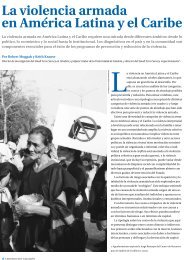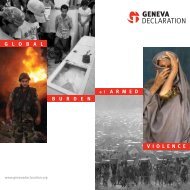Tackling Violence against Women: From Knowledge to Practical
Tackling Violence against Women: From Knowledge to Practical
Tackling Violence against Women: From Knowledge to Practical
Create successful ePaper yourself
Turn your PDF publications into a flip-book with our unique Google optimized e-Paper software.
20 [being] more flexible in terms of the depth of investigation of certain <strong>to</strong>pics—<br />
survey instruments can accommodate larger number of more detailed<br />
questions; producing statistics of better quality as a consequence of the fact<br />
that interviewers can be better trained and prepared compared <strong>to</strong> census<br />
enumera<strong>to</strong>rs. The major disadvantage is the lack of the capacity of a sample<br />
survey <strong>to</strong> generate small area statistics (UNSC, 2009, p. 3).<br />
TAckliNG ViolENcE AGAiNsT WomEN<br />
The FC therefore advocate that every national government undertake<br />
dedicated national surveys regularly (UNSC, 2009). In this way, VAw would<br />
be mapped across its different forms and over time, permitting changes in<br />
patterns, prevalence, and frequency evaluations. The national and international<br />
consensus being built up in the FC (including the development and<br />
testing by UNECE of a new VAw module) is a new and important advancement<br />
for VAw research. It is the first plan <strong>to</strong> measure VAw systematically and<br />
globally on a regular basis. The decision taken by the FC <strong>to</strong> seek <strong>to</strong> work<br />
through NSOs makes good sense from a confidence-building perspective.<br />
The reputation of NSOs for impartiality is generally higher than that of NgOs,<br />
making NSO-based surveys more likely <strong>to</strong> be accepted by potential respondents.<br />
NSOs are also the first source of professional statistics and of continuity<br />
in statistical research in most countries. This makes the results of NSO studies<br />
less likely <strong>to</strong> be questioned, increasing their credibility. 13 This report therefore<br />
advocates supporting the recommendations of the FC.<br />
2� Promote field-based research on mapping VaW<br />
The introduction of VAw indica<strong>to</strong>rs in<strong>to</strong> NSO operations will bring some<br />
notable challenges. There could be resistance <strong>to</strong> tracking VAw from those<br />
governments that view it as a private affair or a minor issue relative <strong>to</strong> other<br />
problems of violence and development. In conflict and post-conflict settings,<br />
for example, in which the government is weak or non-existent, it will be<br />
challenging <strong>to</strong> work through NSOs. Furthermore, many NSOs, especially in<br />
poorer countries, already lack the funding and staff <strong>to</strong> collect the statistics<br />
they are officially required <strong>to</strong> produce. Expanding their mandate <strong>to</strong> include<br />
VAw surveys (or a survey module) might be perceived as an additional burden<br />
by some NSOs, as they will probably need <strong>to</strong> revise national statistics and<br />
administrative records. VAw research is also unfamiliar terri<strong>to</strong>ry for most<br />
statisticians, as is the notion that collecting data on sensitive issues requires<br />
different measures, such as providing support (services) for interviewees<br />
and interviewers.<br />
Owing <strong>to</strong> these and other challenges and as an intermediate measure until<br />
systematic national surveys can be carried out by NSOs (see previous section),


